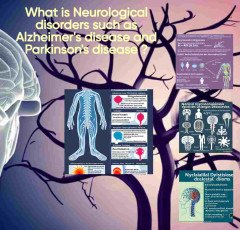
What is Neurological disorders such as Alzheimer's disease and Parkinson's disease ?

The brain and nervous system are both affected by neurological illnesses like Alzheimer's and Parkinson's.
Memory, reasoning, and behavior are all impacted by the gradual and irreversible brain illness known as Alzheimer's disease. In elderly persons, it is the most
typical cause of dementia. When a person has Alzheimer's disease, abnormal proteins accumulate in the brain, which causes brain tissue to shrink and brain cells to die.
This results in symptoms like mood and behavior changes, memory loss, confusion, and language difficulties.
Movement is impacted by Parkinson's disease, a neurological condition. It results from the brain's dopamine-producing neurons dying off.
Chemical messenger dopamine has a key role in regulating movement and coordination. Parkinson's disease patients may develop tremors, stiffness, and issues with balance and coordination as the condition worsens.
Parkinson's disease and Alzheimer's disease are both chronic illnesses that are now incurable.
Treatments, however, are readily available and can assist in controlling the disease's symptoms as well as its progression.
Neurological illnesses including Parkinson's and Alzheimer's disease are linked to a number of risk factors.
While some risk factors can be changed, others cannot. The likelihood of having both disorders rises with age, making it the most important non-modifiable risk factor for both conditions.
A family history of the condition, a past history of a head injury, high blood pressure, high cholesterol, diabetes, and a sedentary lifestyle are additional risk factors for Alzheimer's disease. On the other hand, a family history of the condition, exposure to specific chemicals, and head trauma are risk factors for Parkinson's disease.
A medical history, physical exam, and specialist tests, like brain imaging and laboratory tests, are frequently combined to diagnose neurological illnesses like Parkinson's disease and Alzheimer's disease.
While there is presently no cure for Parkinson's or Alzheimer's disease, there are a number of treatments that can help control the symptoms and halt the disease's progression. Medication, physical therapy, occupational therapy, and speech therapy are some of these treatment options.
Additionally, making lifestyle changes like exercising frequently, eating well, and participating in social activities may help persons with these disorders manage their symptoms and enhance their overall quality of life.
There are a number of supportive therapies that can assist people with neurological diseases and those who care for them manage with the difficulties presented by these ailments in addition to medical treatments and lifestyle changes. Counseling, support groups, and respite care are a few examples of these therapies.
The emotional and psychological effects of neurological illnesses can be managed by neurological problem sufferers and their families with counseling.
Support groups offer a caring environment where people can share experiences and gain knowledge from those who are facing comparable difficulties.
For short periods of time, carers are temporarily relieved by respite care, enabling them to rest and refuel.
There are numerous fascinating advancements being made in the study of neurological illnesses including Parkinson's and Alzheimer's disease.
Researchers are better understanding the underlying mechanisms of these disorders because to developments in genetics and brain imaging, and novel medicines are being created that specifically target these pathways.
Despite the fact that neurological conditions like Alzheimer's and Parkinson's disease can be difficult to manage and have a substantial impact on patients and their families, there are numerous tools and treatments that can help. For people with neurological illnesses, there is hope for a better future because to continuous research and improvements in therapy.
It is significant to remember that neurological disorders like Parkinson's and Alzheimer's affect not just the people who have them but also their family and carers. In addition to being physically and emotionally taxing, these illnesses can also lead to stress, despair, and burnout in carers.
It is essential for caregivers to look after their own health and ask for assistance when necessary.
More has to be done to increase societal understanding and awareness of neurological illnesses.
This can promote early detection and diagnosis and lessen the stigma attached to certain disorders. Additionally, it may result in better services and support for those impacted by these conditions, both personally and as a family.
Complex illnesses that affect the brain and nervous system are neurological disorders like Alzheimer's disease and Parkinson's disease.
Although some illnesses do not yet have a cure, there are medications and supportive therapies that can help control symptoms and enhance quality of life.
There is hope for a better future for people with neurological illnesses and their families because to ongoing research and advancements in therapy.
It is important to remember that there is no one-size-fits-all method for treating neurological illnesses like Parkinson's and Alzheimer's.
Individualized treatments and therapies may be necessary because every person differs in their needs and symptomology.
The progression of these disorders can be unpredictable, and over time, a person's symptoms may change.
Individuals and their families should collaborate closely with healthcare professionals to create a care plan that is tailored to their unique requirements and to periodically review and modify the plan as necessary.
There are several lifestyle changes that may help lower the risk of acquiring neurological illnesses, while there is no surefire strategy to prevent these conditions.
These options include obtaining regular exercise, eating well, getting enough sleep, and participating in mentally stimulating activities.
Managing underlying medical issues like diabetes, high cholesterol, and disorders like high blood pressure is also essential.
As a whole, neurological ailments like Alzheimer's and Parkinson's disease are complicated illnesses that can have a big effect on sufferers and their families.
Despite the fact that there is presently no cure, there are numerous therapies and treatments that can help control symptoms and enhance quality of life.
There is optimism for continued progress in treatment thanks to continuing research.
It's crucial to keep in mind that neurological illnesses can have varying effects on people and progression rates.
As a result, it's critical that patients and their families collaborate closely with healthcare professionals to create a personalized care plan that takes into account each patient's particular needs.
The social and emotional needs of people with neurological illnesses must also be met.
The quality of life for those with these conditions can be significantly improved by social support from family, friends, and the community.
There is promise for novel therapies and interventions to help manage symptoms and enhance outcomes as research into neurological illnesses continues.
We may contribute towards a brighter future by funding research and encouraging awareness and comprehension of these disorders.
It is more crucial to understand the effects that neurological conditions can have on society as a whole.
These disorders can have a considerable negative impact on healthcare systems, economies, and productivity while also raising healthcare expenses.
As a result, there is an increasing need for legislation, initiatives, and research that can help with the diagnosis, prevention, and treatment of neurological illnesses in both individuals and their families.
In order to effectively manage neurological disorders, healthcare professionals, researchers, policymakers, people who have neurological disorders, and their families and carers must all work together. Together, we can make a difference in the lives of those who are impacted by these issues and work to create a more promising future.
A multidisciplinary approach is necessary for the management of neurological disorders, involving healthcare
professionals, researchers, policymakers, people who have neurological disorders, as well as their relatives and caregivers.
Collaboration can improve outcomes, raise awareness of neurological illnesses, and enhance the quality of care provided to patients with these conditions.
Innovations and technological advancements have the power to completely change the field of neurology.
For instance, telemedicine and the use of virtual reality can help people with neurological illnesses get the care they need, especially those who live in distant or underserved locations. Health care practitioners can monitor symptoms and modify treatments as necessary with the use of wearable technology and sensors, which can give useful data.
Complex problems with a considerable effect on both individuals and society as a whole include neurological disorders like Alzheimer's and Parkinson's disease.
By cooperating, we can raise awareness and knowledge, support continuing research, and innovate better treatment for people with these disorders.
Technology and innovation developments have the potential to completely change the area of neurology and enhance the quality of life for those with neurological illnesses. Artificial intelligence (AI) and machine learning, for instance, can be used to analyze vast volumes of data and find patterns and trends that can guide diagnosis and treatment choices.
There are intriguing paths for creating novel medicines for neurological illnesses, including gene therapy and stem cell research.
In these methods, damaged cells and tissues in the brain and nervous system are repaired or replaced utilizing genetic engineering and regenerative medicine.
The significance of social support for people with neurological illnesses and their families should also be noted.
Individuals and families impacted by these disorders can get helpful information and social support from community-based programs and organizations.
The diagnosis and treatment of neurological illnesses must take a multidisciplinary approach because they are complicated, diverse conditions.
For people with neurological illnesses and their families, improvements in technology, research, and community support give hope for better results and a brighter future.
Should be aware of how neurological illnesses affect families, people, and society as a whole.
Health care professionals, researchers, politicians, and the general public must work together to manage these illnesses effectively.
To create new and better interventions and therapies for people with neurological illnesses, it is crucial to give research and innovation in the field of neurology top priority. This can entail investigating novel treatments like gene therapy, stem cell research, and other cutting-edge ideas.
To enhance access to care for people with these problems and to raise awareness of and understanding of neurological disorders.
This involves speaking up in favor of laws and initiatives that assist sufferers of neurological conditions, their loved ones, and carers, as well as educating and assisting the larger community.
Together, we can increase our understanding of neurological illnesses, enhance the lives of those who have them, and promote better outcomes for all those who are impacted by these difficult and complicated problems.
To improve the management and care of people with neurological illnesses, we must collaborate. Healthcare professionals, researchers, legislators, and the general public must work together on this.
Promoting early detection and intervention for neurological illnesses is a crucial component of this endeavour.
Early diagnosis can help people and their families plan and get ready for future challenges. It can also result in early treatment and better outcomes.
Increasing access to care for people with neurological illnesses is another crucial factor.
This may entail creating fresh, cutting-edge models of treatment, such telemedicine and community-based initiatives, as well as tackling obstacles to care, like cost and accessibility.
To better comprehend and treat neurological illnesses, we must continue to make investments in research and innovation.
This involves learning more about the genetic and environmental variables that contribute to these illnesses, as well as looking into novel treatments and interventions.
We can improve the lives of people with neurological disorders and their families, lessen the impact of these conditions
on society, and work toward a brighter future for everyone affected by these difficult conditions by cooperating and
promoting awareness, understanding, and innovation.
Promoting continual education and training for medical professionals, researchers, and the general public is a crucial
part of improving the management and care of people with neurological illnesses. This can support best practices in diagnosis, treatment, and care while also raising awareness and knowledge of these disorders.
It's critical to acknowledge the special requirements and difficulties that people with neurological illnesses and their families confront.
In addition to providing access to tools and assistance to help people and families manage the intricacies of these disorders, this also entails addressing the physical, emotional, and social effects of these conditions.
Promoting patient-centered care is a crucial part of enhancing the management and treatment of neurological illnesses.
Recognizing the value of tailored care that takes into consideration each patient's particular requirements and preferences as well as involving patients and their families in the decision-making process are necessary for this.
Promoting laws and initiatives that assist people with neurological illnesses and their families is crucial.
This entails advancing access to care, boosting financing for research and innovation, and arguing in favor of laws and rules that uphold the rights and dignity of people with neurological illnesses.
By collaborating and advancing patient-centered care, education, and awareness, we can enhance the treatment of neurological disorders and work towards a better future for everyone impacted by them.














 Creative Brief For Video Shoot
Creative Brief For Video Shoot  ELECTRONIC ACCESSORIES
ELECTRONIC ACCESSORIES  Hello Theme
Hello Theme  SEO Checklist
SEO Checklist  Men Clothing
Men Clothing  Best Home Appliances
Best Home Appliances  ASUS Laptop
ASUS Laptop  BEST SELLER TOP10
BEST SELLER TOP10  Women Fashion
Women Fashion  RPM 3.0
RPM 3.0  Smart Doorbell
Smart Doorbell  All Wireless Products
All Wireless Products  Online Technology Classes
Online Technology Classes  Best Sellers On Amazon
Best Sellers On Amazon  Unlimited access to classes on illustration, photography, design, film, music
Unlimited access to classes on illustration, photography, design, film, music  Artificial Intelligence
Artificial Intelligence  Only For The United States
Only For The United States  Amazon Best Selling Products
Amazon Best Selling Products  Best Robotic Vacuum Cleaners
Best Robotic Vacuum Cleaners  ASPINAL LONDON
ASPINAL LONDON  Hot Bags For Pain Relief
Hot Bags For Pain Relief  Sennheiser
Sennheiser  Top Rated From Amazon
Top Rated From Amazon  One World Collection
One World Collection  SOFAS
SOFAS  Graphics & Design
Graphics & Design  Acer Laptop
Acer Laptop  Favorite Company (Cuelinks)
Favorite Company (Cuelinks)  The Click Engine
The Click Engine  Unreal Engine 5 For Beginners Learn The Basics Of Virtual Production
Unreal Engine 5 For Beginners Learn The Basics Of Virtual Production  Online Marketing
Online Marketing  NordLocker
NordLocker  NordVPN
NordVPN  TitTok Revolution
TitTok Revolution  Best Selling Books
Best Selling Books  NordPass
NordPass  The Secret Email System
The Secret Email System  1150+Trendy kids coloring pages Bundle
1150+Trendy kids coloring pages Bundle 
















